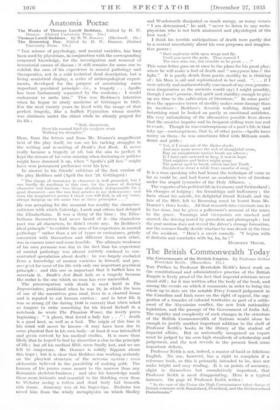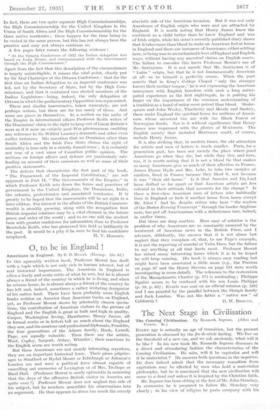The British Commonwealth Today
The Governments of the British Empire. By Professor Arthur Berriedale Keith. (Macmillan. 21s.) THE Preface to Professor Berriedale Keith's latest work on the constitutional and administrative practice of the British Empire is lively proof of the fact that imperial relations never stand still ; for it was written after the body of the book, and among the events on which it comments in order to bring the whole up to date arc the notable Privy Council judgement in the Canadian and Irish cases on the right of appeal, the sug- gestion of a transfer of colonial territories, as part of a settle- ment of the Abyssinian conflict, the new Irish nationality legislation, and the passage of the Government of India Act, The rapidity and complexity of such changes in the structure of the British Commonwealth of Nations would alone be enough to justify another important addition to the shelf of Professor Keith's books in the library of the student of imperial affairs. But so universally recognised an expert must be judged by his own high standards of scholarship and judgement, and the test reveals in the present book seine important defects.
Professor Keith is not, indeed, a master of lucid or felicitous English. No one, however, has a right to complain if a reference book, as this is primarily intended to be, does not make bright and easy reading. it is on points of accuracy, slight in themselves but cumulatively important, that Professor Keith is most disappeinting. Here is a typical instance. On page 81 Professor Keith writes :
"In the case of the Union the High Commissioner takes charge of British relations with Basutoland, 'Swaziland, and the Bechuanaland
Protectorate." in fact, there are two quite separate High Conimissionerships, the High Commissionership for the United Kingdom in the Union of South Africa and the High Comrnissionership for the three native territories ; these happen for the time being to be vested in the same person, but this has not always been the practice and may not always continue so.
A few pages later comes the following sentence :
"At the Ottawa Conference of 1932 the Indian delegation was based on India House, and communicated with the Government through the High Commissioner."
. Apart from the fact that this description of the circumstances is largely unintelligible, it misses the vital point, clearly put by Sir Atul Chatterjee at the Ottawa Conference : that for the first time an Indian delegation to an imperial conference was led, not by the Secretary of' State, but by the High Com- missioner, and that it contained two elected members of the Indian Legislature—being, indeed, the only delegation at Ottawa in which the parliamentary Opposition was represented.
These and similar inaccuracies, taken separately, are not perhaps serious, but there are far too many of them. And some are grave in themselves. In a section on the unity of the Empire in international affairs Professor Keith writes of the Dominions' claim to the right to keep out of Great Britain's wars as if it were an entirely post-War phenomenon, omitting any reference to Sir Wilfrid Laurier's demands and other even earlier instances. His assertion that no Dominion other than South Africa and the Irish Free State claims the right of neutrality is true only in a strictly formal sense ; it is certainly not true of a vast mass of Canadian public opinion. The sections on foreign affairs and defence arc particularly mis- leading on account of their omissions as well as some of their positive statements.
The defects that characterise the first part of the book, "The Framework of the Imperial Constitution," are not apparent in Part II, " The Governments of the Empire," in which Professor Keith sets down the forms and practices of government in the United Kingdom, the Dominions, India, the colonies, protectorates and, mandated territories, it is greatly to be hoped that the inaccuracies will be set right in a later edition. For interest in the affairs of the British Common- wealth is steadily. growing, along with the recognition that British imperial relations may be a vital element in the future peace and order of the world ; and to no one will the student turn with greater confidence for information than to Professor Berriedale Keith, who has pioneered this field so brilliantly in the past. It would be a pity if he were to find his confidence



































 Previous page
Previous page